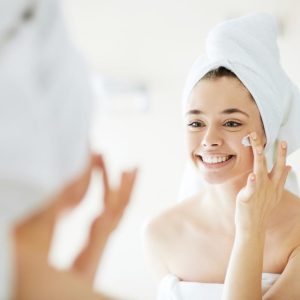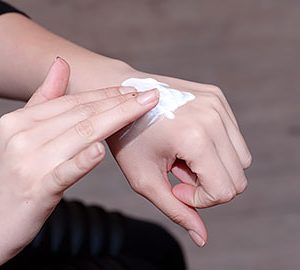Everyone wants glowing, flawless skin. But for most of us who aren’t blessed with naturally perfect genes, it’s hard to get there, especially when you have skin conditions like acne to battle along the way. All hope is not lost, though. Just about anyone can have great skin, and the best part? It doesn’t always require you to dish out two months of your paycheck on some ambitious beauty treatment. Some skincare tips take less effort than you may think to give you visible results over time, like decreased redness, increased glow, and acne control.
We asked the experts—dermatologists, aestheticians, beauty experts, and even a supermodel—for their best-kept secrets to flawless skin. While they may be a longer-term commitment, these simple lifestyle tweaks are guaranteed to reap significant results.
Hydrate immediately after cleansing
Austin, Texas–based aesthetician Renée Rouleau says that one of the biggest skincare mistakes people make is waiting too long after washing to apply moisturizer. Whether it’s face or body lotion, “you have just a short window after cleansing to put on a hydrating product before moisture starts to evaporate,” says Rouleau. “If you let your skin dry completely, the water on your skin plus any moisture in your skin will start to get pulled into the air.”
Ellen Marmur, MD, a board-certified dermatologist in New York City, recommends accelerating in the shower, too. “Long showers strip your natural oils. That’s why some people have a chronic itchy spot on their back.”
RELATED: Are You Moisturizing All Wrong? Don’t Make These 8 Common Mistakes
Consider your water
“Soft water doesn’t remove soap well, so it can leave a residue on your skin,” says Susan H. Weinkle, an assistant clinical professor of dermatology at the University of South Florida. If your water is soft, use face and body cleansers sparingly (no more than a nickel- or quarter-size amount, respectively). Hard water, on the other hand, doesn’t allow washes to lather easily, prompting you to use even more cleanser, which can cause dryness. Gentle, nonsoap formulas, which aren’t meant to lather, can minimize this, says Carolyn Jacob, MD, a board-certified dermatologist in Chicago, Ill. To check the water quality in your area, log on to the Environmental Protection Agency’s website.
Keep stress in check
It takes a toll on nearly every part of your body, including your skin. In a study conducted at Stanford University, researchers found that during exam time, students who felt stressed had more severe acne breakouts than those under less pressure. That’s because stress increases the body’s production of hormones such as cortisol, which can make skin oilier and decrease its ability to fight off acne-causing bacteria, says Lisa Donofrio, an associate clinical professor of dermatology at the Yale University School of Medicine. To keep that frazzled feeling under control, regularly practice stress-management techniques, like yoga, deep breathing, and meditation. This “can help conditions such as acne, psoriasis, rosacea, and seborrhea,” Donofrio says.
RELATED: The Best Serums to Solve Every Skin Problem
Exercise early and often
“One of the main functions of the skin is to regulate heat, so when you’re working out, the blood vessels in the skin dilate to bring warm blood to the surface, allowing heat to be transferred out of the body and into the air. This gives you a glowy flush,” says Dr. Marmur, who begins every day with 30 minutes of running, cycling, or basketball. Boosting blood flow also ensures that your skin is getting the oxygen and the nutrients that it needs to be healthy. “Skin is your body’s last priority. Blood goes first to the brain and core organs, so getting blood filled with nutrients pumping all the way to your skin first thing in the morning means it starts the day healthy too,” says Dr. Marmur.
Reassess your skincare routine
Don’t go on autopilot with your skincare, says Dr. Marmur, who eschews a set routine in favor of amassing a mindful collection of products, then customizing day by day. “If my skin looks good and feels comfortable,” she says, “I use a lighter night cream. In October, when the barometer drops and my skin becomes drier, I choose a richer formula.” Similarly, several women mentioned their devotion to masks, which help them treat temporary conditions, like sensitivity and dryness. “I use an exfoliating clay mask followed by a hydrating mask when I’m having my morning coffee,” says Jessica Alba, the founder of Honest Beauty. Pamela Baxter, the founder of Bonafide Beauty Lab, alternates Fresh Black Tea Instant Perfecting Mask ($38; nordstrom.com) to hydrate, with Sapelo Anti-Aging Enzyme Mask ($75; saksfifthavenue.com), to exfoliate, up to three times a week.
RELATED: Ask a Beauty Editor: Can You Recommend an Affordable Anti-Aging Routine?
Watch sun exposure indoors
Yes, you read it right: UV rays (in particular, UVA rays) can penetrate the windows in your home and office and cause wrinkling and brown spots. The same goes for car windows: Studies have found higher rates of skin cancers on the left side of the face and upper body than on the right, since that side is more exposed when you’re driving. Cancers aside, “many people have more wrinkles and sun damage on the left side of their faces, too,” notes Donofrio. Make protection a no-brainer by always wearing a moisturizer with SPF.
Try a new tool
Picture a mini paint roller studded with tiny metal needles and you have yourself a derma roller. The popular tool pricks holes in the skin’s top layer (pain is minimal), with the aim of creating minuscule pathways for lotions and serums to burrow deeper into the epidermis and so be more effective, says Mashell Tabe, an Albuquerque-based aesthetician, who uses a derma roller almost every night—our favorite is ORA Gold Deluxe Microneedle Dermal Roller ($30; dermstore.com). She also swears by in-office microneedling (which ranges from $250 to $1,000), a more intense procedure that involves a motorized needling device that goes deeper into the skin, causing tiny wounds and stimulating collagen production.
RELATED: 10 Beauty Rollers That Actually Do Something for Your Face
Treat your skin from the inside
“To keep my skin clear and firm, I eat the building blocks of collagen—such as copper, found in nuts and seeds; and lysine, found in legumes and lean meats,” says Dr. Marmur, who adds that foods with zinc and magnesium also help combat acne. Although there are not piles of scientific studies proving that a healthy diet equals better skin, says Dr. Marmur, “I’ve seen overwhelming anecdotal evidence in my practice and in my own skin.” Whitney Bowe, MD, board-certified dermatologist in New York City, agrees; a glow-boosting trick that she uses when her skin looks sallow is to raise her beta-carotene intake by adding carrots or sweet potatoes to a smoothie.
Finally, and you’ve heard it before: Most experts interviewed said that drinking water is a must. Josie Maran, a model and the founder of Josie Maran Cosmetics, tricks herself into guzzling more with a bit of flavor doctoring. “I make fruit-, vegetable-, and herb- infused waters,” she says. “My favorite is spiking water with chopped strawberries and basil.”
And what to avoid? Dairy. Scientists don’t understand exactly why milk products can lead to acne, but some surmise that the natural hormones present in dairy may be to blame, says Leslie Baumann, MD, a board-certified dermatologist in Miami Beach, Fla, who notes that even organic milk can cause breakouts. Cottage cheese, instant breakfast drinks, and sherbet are also linked to acne. While cutting back on dairy won’t solve a pimple problem single-handedly, it may make a difference for those who suffer severe breakouts, say experts. (If you go this route, be sure you’re getting enough calcium from other food sources, such as leafy greens, or consider taking a supplement.)

RELATED: These Are the 5 Best Acne Treatments, According to Thousands of Reviews
Exfoliate more
“As we age, skin cells turn over at a slower rate than they did in our 20s,” says Dr. Bowe. The result: Without help from scrubs, peels, or even a clean washcloth, dead skin cells can build up on your face and body, clogging pores, preventing products from penetrating, and making your complexion look dull. Dr. Bowe uses Dr. Brandt Microdermabrasion Skin Exfoliant ($79; drbrandtskincare.com) twice a week on her face and hands.
Baxter has devised an exfoliating plan for her rosacea-prone skin: “I cleanse every night with the gentle Foreo Luna cleansing brush ($129; foreo.com), and every two days I use Tatcha Polished Classic Rice Enzyme Powder ($65; sephora.com), which does not irritate.” Supermodel Christie Brinkley has been exfoliating for more than 40 years. “There weren’t face scrubs when I was a teenager, so I used a foot scrub on all of my skin starting at 19,” says Brinkley. She has long since switched to a gentler scrub made for the face, and she believes this is the secret to getting circulation going and diminishing puffiness in the morning. Sloughing below the neck is also key, says Palm Beach, Florida–based aesthetician Tammy Fender, who dry-brushes before she showers.
Pay attention to your cleanser
It may sound counterintuitive, but if you have dry skin, your choice of face wash may be even more important than your moisturizer. “A nonsoap cleanser is ideal because it helps replace the moisture barrier in the skin,” Donofrio says.
“Consider it a preventive approach,” adds Berson. “You can use your cleanser to avoid dryness, eczema, and psoriasis, rather than just treating these issues when they flare up.” That said, applying a moisturizer after you cleanse is still smart. And if you’re using an acne medication, wait 10 minutes after you wash to minimize irritation.
RELATED: What Is Micellar Water, and Should I Be Using It?
Choose water-based hair products
Some conditioners, as well as pomades, volumizers, and styling creams, contain oils or waxes that can clog pores and create acne, especially on the forehead, the back, and the hairline. Even if you’re careful to avoid getting them on your skin, they can run down your face and body as you shower and when you sweat, or be transferred by your pillowcase while you sleep. Instead, look for water-based formulas and avoid those containing mineral oil, beeswax, or microcrystalline wax. Or consider SEEN Haircare products, a line of shampoos, conditioners, and styling aids created to help minimize breakouts.
Check your medicine cabinet
Some oral contraceptives, antibiotics, fertility drugs, and antiseizure medications can bring on breakouts, says Jerome Litt, MD, a board-certified dermatologist in Beachwood, Ohio. Antihistamines, diuretics, and some antidepressants can cause dry skin. And certain antibiotics, diuretics, and diabetes treatments can make you vulnerable to sun damage. “If you find your skin is reacting more while you’re taking a particular drug, talk to your physician,” says Dr. Litt. “He or she may be able to either lower the dosage or switch you to a different medication.”
Get a good night’s rest
“The skin repairs itself at night, so the more sleep you get, the more time your complexion has to rejuvenate,” says Dr. Bowe. And the benefits are not just long-term. In many cases, you can see results the next morning. “The more sleep I get, the less makeup I need, because my skin looks naturally refreshed,” says Alba.
And the opposite is also true. “Under-eye puffiness can be caused by a spike in cortisol levels,” says Dr. Bowe. “Beauty sleep is no joke—you truly need seven to eight hours. When you don’t get enough sleep, your cortisol levels increase, and when that happens, that boosts the rate of collagen breakdown, causing under-eye bags to appear.”
FYI: “Yawning and squinting can break down collagen and elastin around the eyes, too,” says Dr. Bowe.



